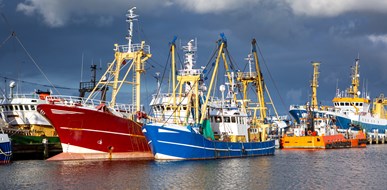[New blog post] UK-EU fish fight: first major post-Brexit legal battle nears verdict
Published 11 February 2025By Eva Kassoti

By ollo (iStock)
The first major legal dispute between the UK and EU under their post-Brexit trade agreement is set to reach its conclusion next month, centering on Britain's controversial ban on sandeel fishing in its waters, writes researcher Eva Kassoti in a new blog post on Verfassungsblog.
The legal case, heard before the Permanent Court of Arbitration in The Hague last week, marks the first time in which a dispute between the EU and UK under the 2021 Trade and Co-operation agreement (TCA) reaches the stage of arbitration. The dispute is testing the Post-Brexit legal framework, in a case where the UK’s regulatory autonomy to adopt unilateral environmental measures for the protection of the marine environment is pitted against the EU vessels’ right to access and fish in British waters, writes Kassoti in “Small fry – The UK Sandeel case before the PCA (EU vs UK).
At the heart of the dispute is the UK's 2024 decision to prohibit all sandeel fishing in English North Sea waters and Scottish waters, citing environmental protection of marine species such as puffins that rely on sandeels for survival. The ban particularly affects Danish vessels, which hold over 96% of the EU's sandeel fishing quota in British waters.
The European Union challenges the ban's compatibility with the 2021 Trade and Cooperation Agreement (TCA), arguing that the UK's measures neither rely on "best available scientific advice" nor meet the requirements for "proportionate and non-discriminatory" fisheries management. The EU contends that the scientific evidence supporting the total closure lacks methodological rigor and that a partial closure could have achieved the same environmental benefits. The measures are further inconsistent with the UK’s obligation to grant EU vessels “full access to its waters to fish” under Art. 2(1)(a) of Annex 38 TCA.
The UK counters that its measures are well within its regulatory autonomy to protect marine resources, arguing that the EU's interpretation of "best available scientific advice" is overly restrictive and fails to account for the precautionary approach in environmental protection.
“Take back control”
Politically, the stakes are high. Fishing featured prominently in the Brexit campaign with promises to “take back control” of British waters. Furthermore, the dispute could be a stumbling block to the current British government’s efforts to reset the EU-UK relationship post-Brexit and it compounds the difficulties of renegotiating fishing access before the TCA fisheries chapter expires in June 2026.
According to Eva Kassoti, the Sandeel case is legally quite complex. She writes: “It involves not only the interpretation of the TCA in light of relevant rules of international law (31 (3)(c) VCLT) but also highly technical questions such as clarifying the parameters for evaluating what amounts to “best available scientific evidence” as well as the role of the precautionary approach in the context of fisheries management and its relevance in the interpretation of “best available scientific evidence”. This is a key issue – and one that is likely to also arise before international courts currently dealing with high-profile climate change litigation cases, such as those pending before the ICJ and the IACtHR.”
The tribunal's decision, expected in April 2025, could set important precedents for future environmental measures and their interaction with international trade obligations. It may also influence similar cases pending before international courts dealing with climate change litigation.
The verdict will be closely watched by environmental groups, fishing communities, and trade experts as a test of post-Brexit dispute resolution mechanisms and the balance between environmental protection and fishing rights.
Read the full blog.
About Eva Kassoti
Dr Eva Kassoti is a senior researcher in EU and international law and academic co-ordinator of the Centre for the Law of EU External Relations (CLEER) at TMC Asser Instituut. Read more.
Global Europe
Within T.M.C. Asser, the ‘Global Europe’ project is geared towards exploring the internal and external factors that may challenge the EU’s capacity to exercise value-based global leadership on a number of crucial issues that affect both European citizens and others; to critically reflect on whether the external projection of the EU as a virtuous normative power comports with its practice on the ground as well as to address the descriptive, conceptual and normative challenges that complement the ever-expanding global reach of EU law. Read more.
About CLEER
The academic research network CLEER aims to provide the tools to understand the multi-faced and intra-disciplinary reality of the law and policy of EU external action. CLEER is a unique repository of legal expertise bridging practitioners with academia, and merging practice with theory. Read more.

